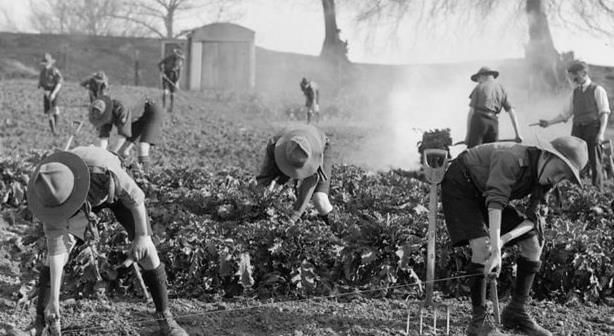How did children help the war effort? | History for Year 6 PDF Download
Why did children join the war effort?
Between 1914 and 1918, everyone was encouraged to contribute to the war effort, and British children were eager to help. They took on various tasks, grew food, and raised funds to support their fathers and older brothers fighting on the front lines while assisting their families, particularly their mothers, at home.
What did 'growing your own' mean?
‘Growing your own’ food became crucial during the war due to food shortages caused by German U-Boats sinking supply ships. Children played a key role by digging, weeding, and tending to vegetable patches to help produce food.

Fundraising and collecting
Children gathered items like blankets, books, and even conkers. Some of these were sent to soldiers at the front, while others were sold to raise money for the war effort. Funds were used to build warships or support wounded soldiers, and a Blue Cross fund was established to aid injured war horses.
How did Boy Scouts help the war effort?
Boy Scouts supported the war by delivering messages for the War Office, guarding railway lines, water reservoirs, and coastlines, and monitoring the skies for attacks, using bugles to signal the end of air raids. They also trained at rifle ranges to learn shooting skills in case of an invasion.
How did Girl Guides help the war effort?
Girl Guides contributed by knitting socks and scarves to keep soldiers warm, learning first aid to assist with injuries, and delivering messages and milk. Some reports indicate they also served as messengers for MI5, the British Secret Service.
How did children help their families?
Children supported their families by performing tasks like caring for younger siblings, helping with household chores, or standing in long queues for food. These efforts were vital in easing the burdens faced by adults during the challenges of wartime.

|
3 videos|69 docs
|
FAQs on How did children help the war effort? - History for Year 6
| 1. Why did children join the war effort? |  |
| 2. What did 'growing your own' mean? |  |
| 3. How did Boy Scouts help the war effort? |  |
| 4. How did Girl Guides help the war effort? |  |
| 5. How did children help their families? |  |
















